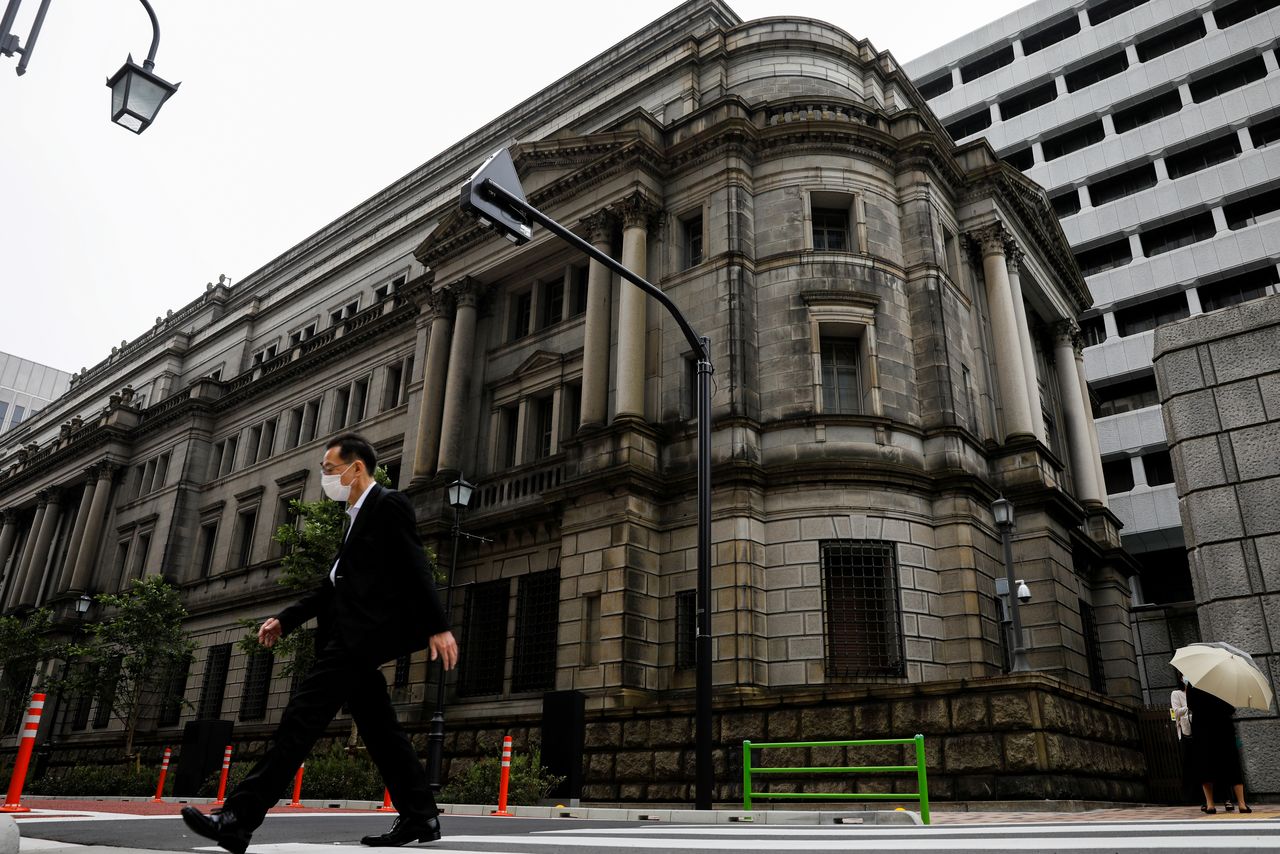Exclusive-BOJ likely to warn of hit from Asia bottlenecks on exports, output - sources
Newsfrom Japan
Economy- English
- 日本語
- 简体字
- 繁體字
- Français
- Español
- العربية
- Русский

FILE PHOTO: A man wearing a protective mask walks past the headquarters of Bank of Japan amid the coronavirus disease (COVID-19) outbreak in Tokyo, Japan, May 22, 2020.REUTERS/Kim Kyung-Hoon
By Leika Kihara
TOKYO (Reuters) - The Bank of Japan is expected to offer a slightly bleaker view on exports and output this month, or warn of heightening risks from supply disruptions caused by factory shutdowns in Southeast Asia, said sources familiar with its thinking.
The gloomier assessment, combined with weaker-than-expected consumption in August due to coronavirus curbs, could cast doubt on the BOJ's view that the economy is on track for a moderate recovery as it gears up for its policy meeting on Sept. 21-22.
"While overseas demand remains strong, the supply shock from Southeast Asia has put an unexpected damper on output," said a source familiar with the BOJ's thinking, a view echoed by three other sources. The sources could not be named because they were not authorised to speak publicly.
"Risks to the economy have heightened," a second source said, warning of uncertainty over when supply chain disruptions will be resolved, and how long it will take for the economy to fully emerge from its pandemic doldrums.
Robust exports have helped underpin Japan's fragile economic recovery from COVID-19. But supply constraints, mainly for chips and parts produced in Southeast Asia, have forced some Japanese firms to slash output, raising concerns among policymakers that Japan's recovery could be delayed.
In its last assessment made in July, the BOJ described exports and output as "continuing to increase steadily."
At the September meeting, the BOJ may qualify that view by mentioning how output, in particular, is temporarily weakening due to the supply constraints, the sources said.
The BOJ board will also debate at the meeting whether the recent weak batch of data would warrant downgrading its assessment of the economy from the current view that it is "picking up as a trend," the sources said.
Most BOJ officials see no need to alter their long-term view the economy will recover next year through 2023 as the pandemic subsides, and expect solid global demand to underpin exports, they said.
But there is growing alarm within the central bank that the start of Japan's recovery could be delayed with supply bottlenecks and prolonged pandemic-related curbs weighing on the fragile economy, they said.
Japan has been struggling with a fifth wave of the virus and on Thursday extended its long-running curbs until the end of this month for Tokyo and other regions, a move seen further weighing on household spending.
"A while ago, I thought the economy would recover as vaccinations proceed. Now, we're seeing risks emerge regarding that scenario," BOJ Deputy Governor Masazumi Wakatabe told a briefing last week. "I think Japan's recovery will be delayed."
Toyota Motor Corp cut its annual production target by 300,000 vehicles on Friday as rising COVID-19 infections slowed output at parts factories in Vietnam and Malaysia, compounding a global shortage of auto chips.
Japan's auto industry lobby said disruptions could last through October.
The BOJ is widely expected to keep monetary settings unchanged at the September meeting. It will issue revised quarterly growth and inflation forecasts at a subsequent meeting on Oct. 27-28.
(Reporting by Leika Kihara, Additional reporting by Takahiko Wada and Kentaro Sugiyama; Editing by Sam Holmes and Ana Nicolaci da Costa)
(c) Copyright Thomson Reuters 2021. Click For Restrictions -
https://agency.reuters.com/en/copyright.html